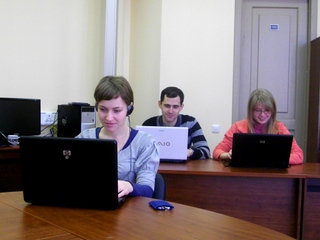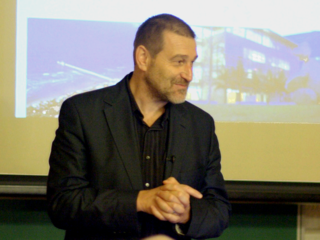Set in the magistracy of the Academic University (St. Petersburg)

The widespread transition to the Bologna system gives students the opportunity to change the university after receiving a bachelor's degree, but not all students understand how this can change their lives. In many universities, the master's program is very “sparse”: there are a lot of non-core courses (philosophy, cultural studies, etc.), there are very few specialized courses, and in order to pass them, you just have to appear at the exam / test.
Those who still have the desire to study, the Department of Mathematical and Information Technologies of the St. Petersburg Academic University of the Russian Academy of Sciences invites to the magistracy to study in one of three programs:
- Theoretical computer science (computer science)

The head is the deputy head of the department for scientific work, the leading researcher of the Institute of Physics and Mathematics RAS E.A. Girsh. The training is carried out with the direct participation of the staff of the Institute of Physics and Mathematics, RAS. The curriculum includes basic and advanced courses on algorithms, computational complexity, discrete mathematics, mathematical logic, cryptography, and numerous more specialized subjects reflecting modern directions in computer science. Most of the courses read are supplemented by practical exercises in which students solve interesting and non-trivial tasks that help them navigate the material at a level sufficient to conduct independent research. As special courses, students can be counted courses in Computer Science and Physics and Mathematics Clubs at POMI. An important part of the magistracy are scientific studies , which students carry out under the guidance of specialists in theoretical computer science. - Software development (software engineering)

The training program is based on modern international standards based on the results of consultations with employees of the largest IT companies whose employees are also involved in teaching. In addition to the basic courses (software development technology, object-oriented programming, databases), specialized subjects are also taught (functional programming, ...). The main focus is on individual practical work with students developing software during the semester (an hour a week - individual communication between the student and the teacher). As a practice, students can participate in open-source projects being developed at the department. This specialization is for those students who wish to gain truly demanded knowledge and practical experience in software development on the Russian programming market. - Algorithmic Bioinformatics (algorithmic bioinformatics)

The program is open at the laboratory of algorithmic biology under the guidance of Professor P. Pevzner (UCSD, ACM Fellow). Training includes advanced courses on algorithms, in particular, applied to the analysis of genomic and proteomic data , programming, discrete mathematics, as well as the basics of molecular biology, statistics, machine learning and other more specialized subjects. Under the guidance of laboratory staff, students take part in solving actual problems of bioinformatics . The program is designed to produce high-quality specialists in algorithmic questions of bioinformatics that are in demand both in science and in industry.
You can see specific courses read at the department.
St. Petersburg Academic University of the Russian Academy of Sciences

St. Petersburg Academic University is the first institution of higher education included in the system of the Russian Academy of Sciences. The university has a state license for the right to carry out educational activities 10594 of 07/03/2008, as well as state accreditation (certificate of state accreditation 1458 of 07.07.08).
')
Education is free for students with a bachelor's degree and not previously trained in the magistracy. Provided a deferment from service in the military. Non-resident provided hostel .
For active recreation, students have a sports complex, including a swimming pool, a hall for team sports, an indoor tennis court and a gym.
As part of the training, in 2009, students of the department took part in various international student schools on computer science: Verification Technology, Systems & Applications (France) and Logic & Complexity (Czech Republic).
In addition, in the summer of 2009, an international student school on complexity theory was held by a team of the department based on the Academic University, and in the summer of 2010, Microsoft was a school on data structures and algorithms .
Receipt
Citizens who have a higher vocational education (bachelor’s degree, specialist or master’s degree) and have passed entrance examinations are allowed to enter the Academic University. Applicants who have specialized diplomas are interviewed. The rest pass the exam in computer science and mathematics. If you have any questions, you can ask them via the feedback form on the department website.
Those who wish to enroll in the magistracy of the Academic University, it is recommended to immediately fill out the form on the department website . Completing the form does not oblige to anything, but allows you to receive timely information about the admission, including the date of the preliminary interviews in April-May 2011.
Frequently asked Questions
UPD: FAQ updated.
Source: https://habr.com/ru/post/115474/
All Articles